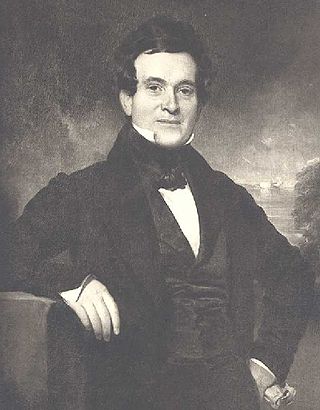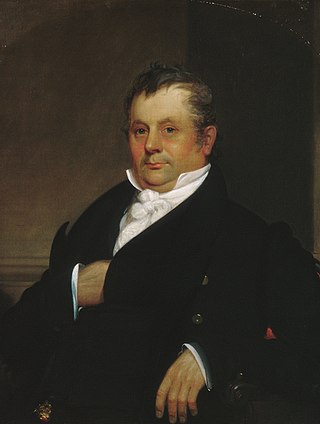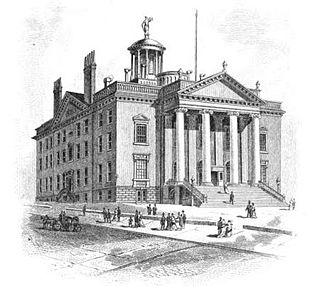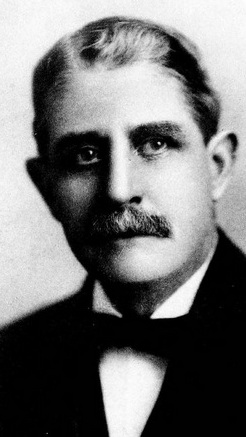
Tammany Hall, also known as the Society of St. Tammany, the Sons of St. Tammany, or the Columbian Order, was an American political organization founded in 1786 and incorporated on May 12, 1789, as the Tammany Society. It became the main local political machine of the Democratic Party and played a major role in controlling New York City and New York state politics. It helped immigrants, most notably the Irish, rise in American politics from the 1850s into the 1960s. Tammany usually controlled Democratic nominations and political patronage in Manhattan for over 100 years following the mayoral victory of Fernando Wood in 1854, and used its patronage resources to build a loyal, well-rewarded core of district and precinct leaders; after 1850, the vast majority were Irish Catholics due to mass immigration from Ireland during and after the Irish Famine of the late 1840s.

Fernando Wood was an American Democratic Party politician, merchant, and real estate investor who served as the 73rd and 75th Mayor of New York City. He also represented the city for several terms in the United States House of Representatives.

William Sulzer, nicknamed Plain Bill, was an American lawyer and politician. He was the 39th governor of New York and a long-serving U.S. representative from the same state. Sulzer was the first, and to date only, New York governor to be impeached and the only governor to be convicted on articles of impeachment. He broke with his sponsors at Tammany Hall, and they produced convincing evidence that Sulzer had falsified his sworn statement of campaign expenditures.

William Bourke Cockran, commonly known as Bourke Cockran or Burke Cochran in contemporary reports, was an Irish-American attorney, Democratic Party politician and orator who represented the East Side of Manhattan in the United States House of Representatives for seven non-consecutive terms between 1887 and 1923. Although associated with the liberal and progressive reform movements, he became widely known as the leading national spokesman for the Tammany Society, the powerful Democratic Party political machine in New York. As an advocate for the gold standard, he crossed party lines to endorse William McKinley in the presidential election of 1896.

Aaron Clark was an American politician who became the second popularly elected Mayor of New York, serving two one-year terms from 1837 to 1839. He was a member of the Whig Party.

The Morgan Iron Works was a 19th-century manufacturing plant for marine steam engines located in New York City, United States. Founded as T. F. Secor & Co. in 1838, the plant was later taken over and renamed by one of its original investors, Charles Morgan.

Gideon John Tucker was an American lawyer, newspaper editor and politician. In 1866, as Surrogate of New York County, he wrote in a decision on a legal malpractice claim against a deceased lawyer's estate: "No man's life, liberty or property are safe while the Legislature is in session."

The Working Men's Party in New York was a political party founded in April 1829 in New York City. After a promising debut in the fall election of 1829, in which one of the party's candidates was elected to the New York State Assembly, the party rapidly disintegrated into factionalism and discord, vanishing from the scene in 1831.
John C. Jacobs was an American politician from New York.
Levi D. Slamm was an American labor leader, the editor of the Daily Plebeian, a radical Democrat and a leader of New York City's Locofocos.
The Allaire Iron Works was a leading 19th-century American marine engineering company based in New York City. Founded in 1816 by engineer and philanthropist James P. Allaire, the Allaire Works was one of the world's first companies dedicated to the construction of marine steam engines, supplying the engines for more than 50% of all the early steamships built in the United States.

The Etna Iron Works was a 19th-century New York ironworks and steam engineering plant, best known for its manufacture of marine steam engines during and after the American Civil War.
Lawrence & Foulks was a 19th-century American shipbuilding company based in New York. Established in the early 1850s, the company built 144 vessels of all types over the course of some fifty years, but is best known for its production of high-speed wooden-hulled steamboats and steamships. Notable vessels built by the company include the record-breaking Hudson River steamboat Chauncey Vibbard, the luxury Long Island Sound steamer Commonwealth, and the fast oceangoing steamships—later U.S. Navy gunboats—Bienville and De Soto. In addition to the domestic market, the company also built ships for service as far afield as South America and China.

Abram Daniel Smith, often abbreviated A. D. Smith, was an American lawyer, politician, and pioneer. As a leader of the Hunters' Lodges, he was elected President of the Republic of Canada in the midst of the Canadian Rebellions of 1837–1838. Later, he became a prominent lawyer in the Wisconsin Territory, and was one of the first justices of the Wisconsin Supreme Court, where he authored a major opinion against the Fugitive Slave Act of 1850.

The 60th New York State Legislature, consisting of the New York State Senate and the New York State Assembly, met from January 3 to May 16, 1837, during the fifth year of William L. Marcy's governorship, in Albany.

Charles Haynes Haswell was a naval engineer, New York City politician and historian. A native resident of New York City, Haswell was author of one of the most broadly circulated engineering manuals of the 19th century, and also published a collection of remembrances of the city drawn from his private journals. He was the first Engineer-in-Chief of the United States Navy.

John F. Ahearn was an American politician and publisher. A prominent New York City political figure and a member of the Tammany Hall political machine, he served in the New York State Assembly, the New York State Senate, and as Manhattan Borough President. He was owner of the T. J. Hayes Printing Company which published plays and other works related to the theatre.

The Locofocos were a faction of the Democratic Party in American politics that existed from 1835 until the mid-1840s.
Erik Heyl (1887–1973) was an American maritime historian and illustrator. He is best known as the author of Early American Steamers, a six-volume work that incorporates illustrations, technical details and service histories of almost 800 steamboats and steamships built mainly in the United States between 1807 and 1870.

The West Street Foundry was an American steam engineering works notable for producing marine steam engines in the mid-19th century. Based in Brooklyn, New York, the company built at least 27 marine engines between 1845 and 1855, including engines for some of the fastest and finest steamboats of the era. The company also built and repaired steam engines and boilers of all types, as well as doing other metalwork. The company failed and was liquidated in 1855.















